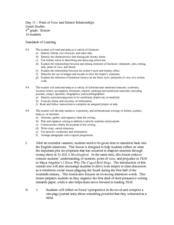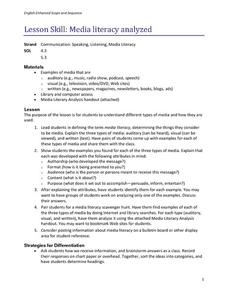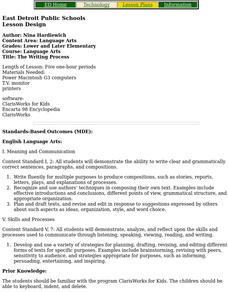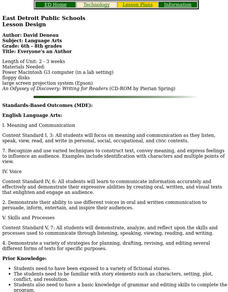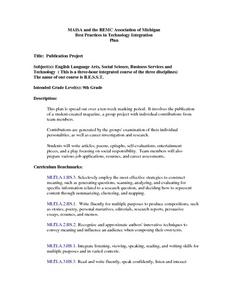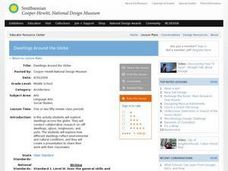Library of Congress
The Emancipation Proclamation and the Thirteenth Amendment
How did the Emancipation Proclamation lead to the Thirteenth Amendment? Middle schoolers analyze primary source documents including the text of the Emancipation Proclamation, political cartoons, photographs, and prints to understand the...
Curated OER
Identifying an Author's Purpose
Students read, "Research Shows TV PSAs Effective In Reducing Teen Marijuana Use", discuss the article with questions imbedded in the lesson and write their own PSA.
Curated OER
Point of View and Mentor Relationships
Tenth graders analyze the role of mentors, point of view, and prejudice using the texts of To Kill a Mockingbird and Maya Angelou's I Know Why the Caged Bird Sings. For this literature analysis lesson, 10th graders review Scout's...
Curated OER
Rudyard Kipling's Rikki-Tikki-Tavi: Mixing Words and Pictures
Create meaningful illustrations to accompany stories in a web-based art and literacy lesson focused on "Rikki-Tikki-Tavi" by Rudyard Kipling. The class takes a virtual art safari with the Museum of Modern Art and then discusses how...
Curated OER
New York City Delights: The Taxi Cab
You set the rate! Step into the shoes of a taxi driver in New York City, and also pretend to be a person who uses taxis to get around town. The class will conduct collaborative research to learn about the history of taxis. Then, they...
Curated OER
Using Logos and Mission Statements to Communicate Sustainable Forestry Information
Young scholars survey forestry foundations to see how they represent important information into their logos and mission statements. In this forestry lesson plan, students use the information to better understand visual representations...
Curated OER
Rudyard Kipling's "Rikki-Tikki-Tavi": Mixing Fact and Fiction
"Rikki-Tikki-Tavi," from The Jungle Book, offers young readers a chance to examine how Rudyard Kipling uses setting and personification to bring to life the brave mongoose who battles cobras to protect his family. Class members explore...
Curated OER
Media Literacy Analyzed
Fourth and fifth graders define the term media literacy, then come up with examples that they share with the class. The types of media studied are auditory, visual, and written. Learners get together in pairs and perform a media...
Curated OER
The Lorax Explorations
Middle schoolers read and debate the purpose of Dr. Seuss' The Lorax, analyze its story elements, and write their own The Lorax II.
Curated OER
Vocabulary: Multiple Meaning Words in Context
Learners use context clues to define words with multiple meanings. After extensive practice with their teacher, learners read through six sentences, they then identify a word with a multiple meaning, and determine its meaning based on...
Curated OER
The Writing Process
Show your young researchers how to find information, brainstorm a topic, map or outline their own stories, and create rough drafts. This lesson also shows learners how to peer edit, conference with the teacher, and write their final...
Curated OER
Using Color as a Pre-Writing Tool
To better understand how to compose a clear and well-organized paper, learners read short passages, write summaries, and make colored graphic organizers. This is a fully developed three-day lesson with suggested assessments.
Curated OER
Entertaining Vancouver's Youth During World War II.
Students investigate relevant period documents and artifacts and have the
opportunity to replicate a 1943-44 entertainment experience by viewing a program
of World War II era motion pictures on site at Vancouver's historic...
Curated OER
Everyone's an Author
Students examine variety of written pieces of quality fiction, discuss what different story elements are present and how those elements make stories as effective as they are, and create a class story.
Curated OER
Autobiography
Sixth graders read and write autobiographical sketches, determine the author's purpose in writing, and type paragraphs using WP utilities.
Curated OER
Publication Project
Ninth graders publish a magazine during a ten week marking period. They make individual contributions to the group project that is based on career choices. They write and publish articles, poems, entertainment pieces, and a play that...
Curated OER
Strike Up the Band
Students create song lyrics celebrating the history of labor unions serving the entertainment industry, then create posters illustrating the importance of each union to the industry they represent.
Curated OER
Elvis
In this excellent music and history lesson, 1st graders watch movies and listen to music sung by Elvis Presley, then draw and write as if they were a famous singer. This entertaining and inventive lesson has a terrific assessment...
Curated OER
Dream Streets
Sixth graders conduct research on the internet to discover the principles of drawing using one and two point perspectives. After examining street scenes by Edward Hopper and postcards of Main Street USA in Disney, they write about and...
Curated OER
Dwellings Around the Globe
Middle schoolers explore dwellings around the globe and conduct collaborative research on cliff dwellings, igloos, longhouses, and yurts. They then explore how different dwellings reflect environmental and cultural conditions, and they...
Curated OER
Cyber Safety
Students explore internet safety. In this cyber safety lesson, students gain information on how to choose safe websites. Students get tips on what types of information is safe to share on the internet and things to be aware of.
Curated OER
Figurative Language 2
Students read nursery rhymes and advertisements to identify examples of figurative language. As a class, students discuss the use of figurative language and its effectiveness in advertising, children's books, rhymes, poetry, etc. ...
Curated OER
The People Next Door
Students explore the culture and tradition of neighboring countries. In this geography lesson, students use travel brochures, reference materials, and Internet sites to investigate the business, fashion, language, and entertainment of...
Curated OER
Geo Jammin' - Day 5, Lesson 16: Capturing "Lions" of Poetry
Second graders participate in the Author's Chair, which is placed in the front of the room. The puppet, Geo George, asks students to take out their poems, then brings them to the Author's Chair individually to share their poems with the...




